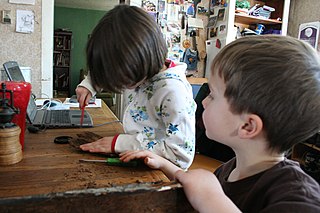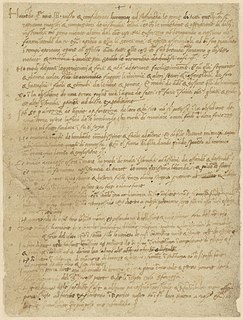Operant conditioning is a type of associative learning process through which the strength of a behavior is modified by reinforcement or punishment. It is also a procedure that is used to bring about such learning.

Unschooling is an informal learning that advocates learner-chosen activities as a primary means for learning. Unschoolers learn through their natural life experiences including play, household responsibilities, personal interests and curiosity, internships and work experience, travel, books, elective classes, family, mentors, and social interaction. Often considered a lesson- and curriculum-free implementation of homeschooling, unschooling encourages exploration of activities initiated by the children themselves, believing that the more personal learning is, the more meaningful, well-understood and therefore useful it is to the child. While courses may occasionally be taken, unschooling questions the usefulness of standard curricula, fixed times at which learning should take place, conventional grading methods in standardized tests, forced contact with children in their own age group, the compulsion to do homework, regardless of whether it helps the learner in their individual situation, the effectiveness of listening to and obeying the orders of one authority figure for several hours each day, and other features of traditional schooling in the education of each unique child.

A nuclear family, elementary family or conjugal family is a family group consisting of parents and their children, typically living in one home residence. It is in contrast to a single-parent family, the larger extended family, or a family with more than two parents. Nuclear families typically center on a heterosexual married couple which may have any number of children. There are differences in definition among observers. Some definitions allow only biological children that are full-blood siblings and consider adopted or half and step siblings a part of the immediate family, but others allow for a step-parent and any mix of dependent children, including stepchildren and adopted children. Some sociologists and anthropologists consider the nuclear family as the most basic form of social organization, while others consider the extended family structure to be the most common family structure in most cultures and at most times.
In behavioral psychology, reinforcement is a consequence applied that will strengthen an organism's future behavior whenever that behavior is preceded by a specific antecedent stimulus. This strengthening effect may be measured as a higher frequency of behavior, longer duration, greater magnitude, or shorter latency.

A longboat is a type of ship's boat that was in use from circa 1500 or before. Though the Royal Navy replaced longboats with launches from 1780, examples can be found in merchant ships after that date. The longboat was usually the largest boat carried. In the early period of use, a ship's longboat was often so large that it could not be carried on board, and was instead towed. For instance, a survey of 1618 of Royal Navy ship's boats listed a 52 ft 4 in longboat used by the First Rate Prince, a ship whose length of keel was 115 ft. This could lead to the longboat being lost in adverse weather. By the middle of the 17th century it became increasingly more common to carry the longboat on board, though not universally. In 1697 some British ships in chase of a French squadron cut adrift the longboats they were towing in an attempt to increase their speed and engage with the enemy.

Georg Christoph Lichtenberg was a German physicist, satirist, and Anglophile. As a scientist, he was the first to hold a professorship explicitly dedicated to experimental physics in Germany. He is remembered for his posthumously published notebooks, which he himself called sudelbücher, a description modelled on the English bookkeeping term "waste books" or "scrapbooks", and for his discovery of tree-like electrical discharge patterns now called Lichtenberg figures.
Child discipline is the methods used to prevent future unwanted behaviour in children. The word discipline is defined as imparting knowledge and skill, in other words, to teach. In its most general sense, discipline refers to systematic instruction given to a disciple. To discipline means to instruct a person to follow a particular code of conduct.

Alfie Kohn is an American author and lecturer in the areas of education, parenting, and human behavior. He is a proponent of progressive education and has offered critiques of many traditional aspects of parenting, managing, and American society more generally, drawing in each case from social science research.
A high-yield investment program (HYIP) is a type of Ponzi scheme, an investment scam that promises unsustainably high return on investment by paying previous investors with the money invested by new investors.
The overjustification effect occurs when an expected external incentive such as money or prizes decreases a person's intrinsic motivation to perform a task. Overjustification is an explanation for the phenomenon known as motivational "crowding out". The overall effect of offering a reward for a previously unrewarded activity is a shift to extrinsic motivation and the undermining of pre-existing intrinsic motivation. Once rewards are no longer offered, interest in the activity is lost; prior intrinsic motivation does not return, and extrinsic rewards must be continuously offered as motivation to sustain the activity.

Subnotebook was a marketing term for laptop computers that are smaller and lighter than a typical 'notebook' sized laptop.
Scipione del Ferro was an Italian mathematician who first discovered a method to solve the depressed cubic equation.

The word geek is a slang term originally used to describe eccentric or non-mainstream people; in current use, the word typically connotes an expert or enthusiast obsessed with a hobby or intellectual pursuit. In the past, it had a generally pejorative meaning of a "peculiar person, especially one who is perceived to be overly intellectual, unfashionable, boring, or socially awkward". In the 21st century, it was reclaimed and used by many people, especially members of some fandoms, as a positive term.

The Italian polymath Leonardo da Vinci (1452–1519) left thousands of pages of writings and drawings, but rarely made any references to his personal life. The resulting uncertainty, combined with mythologized anecdotes from his lifetime, has resulted in much speculation and interest in Leonardo's personal life. Particularly, his personal relationships, philosophy, religion, vegetarianism, left-handedness and appearance.
An incentive program is a formal scheme used to promote or encourage specific actions or behavior by a specific group of people during a defined period of time. Incentive programs are particularly used in business management to motivate employees and in sales to attract and retain customers. Scientific literature also refers to this concept as pay for performance.
Parent management training (PMT), also known as behavioral parent training (BPT) or simply parent training, is a family of treatment programs that aims to change parenting behaviors, teaching parents positive reinforcement methods for improving pre-school and school-age children's behavior problems.

The Notebook is a 2004 American romantic drama film directed by Nick Cassavetes, with a screenplay by Jeremy Leven and Jan Sardi, based on the 1996 novel of the same name by Nicholas Sparks. The film stars Ryan Gosling and Rachel McAdams as a young couple who fall in love in the 1940s. Their story is read from a notebook in the present day by an elderly man, telling the tale to a fellow nursing home resident.
Kike or Kyke is an ethnic slur for a Jew. The earliest record of Kike dates back to the 19th century.
Newspeak is the fictional language of Oceania, a totalitarian superstate that is the setting of the 1949 dystopian novel Nineteen Eighty-Four, by George Orwell. In the novel, the Party created Newspeak to meet the ideological requirements of Ingsoc in Oceania. Newspeak is a controlled language of simplified grammar and restricted vocabulary designed to limit the individual's ability to think and articulate "subversive" concepts such as personal identity, self-expression and free will. Such concepts are criminalized as thoughtcrime since they contradict the prevailing Ingsoc orthodoxy.
Hallucinatory realism is a term that has been used with various definitions since at least the 1970s by critics in describing works of art. In some occurrences the term has had connections to the concept of magical realism, although hallucinatory realism is usually more specific to a dream-state. The term occurs in the motivation for Mo Yan's Nobel Prize in Literature.









